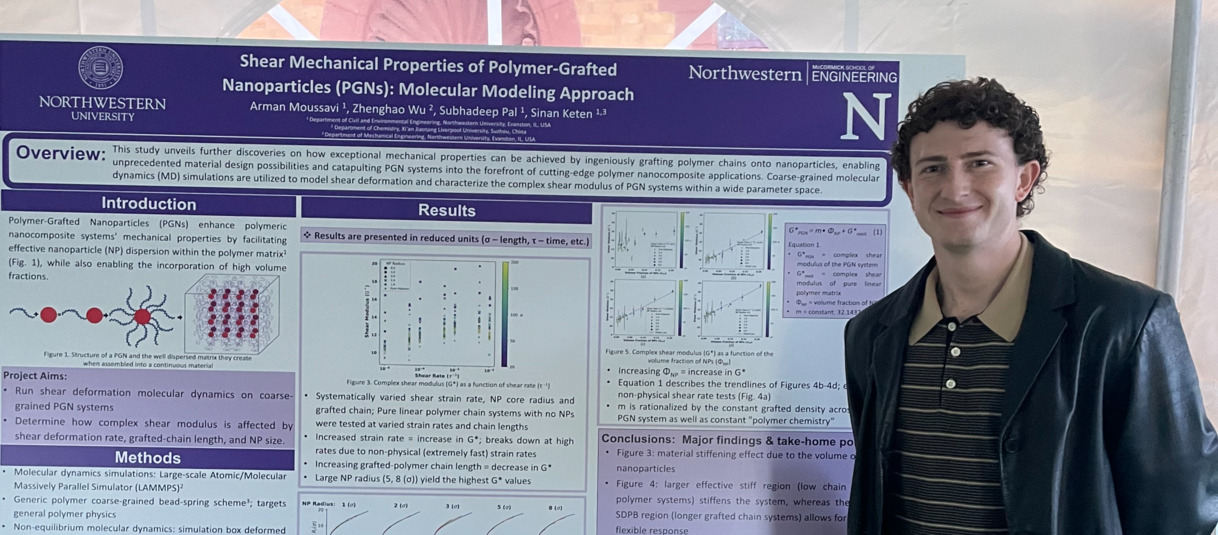Ph.D. Student Spotlight

Arman Moussavi
Ph.D. student Arman Moussavi is one of 2024's Ryan Fellowship recipients. This fellowship supports graduate students dedicated to the exploration of fundamental nanoscale science and to advancing this knowledge into practical applications of benefit to society. Moussavi was nominated by his advisor, Sinan Keten, for the fellowship.
"This fellowship will help to expand my research into new directions for our laboratory and supplement my travel costs as I present my research at conferences."
While his field presents many challenges, Moussavi credits the support of his NU community as a crucial spark for his success.
1. Where are you from?
I am from Omaha, Nebraska.
2. Where did you get your undergrad degree, and what was your major? Do you have an MS?
I received my undergraduate degree in civil and environmental engineering from the University of Nebraska at Lincoln. I did not have a master's degree when I started at Northwestern but received one this past fall along the way to my Ph.D.
3. What attracted you to engineering?
I have always enjoyed solving challenging problems that required hard work, critical thinking, and most importantly, creativity.
4. What attracted you to pursue a Ph.D. in your specialty area?
One of my undergraduate research experiences in materials of engineering exposed me to the cool and exciting topics that scientists get to study in the field, from nanocomposites to biologically inspired materials. Additionally, studying the natural world presents an endless supply of new and interesting questions that require answers.
5. How do you explain your thesis research to a non-scientist?
My research is focused on understanding the fundamental principles of why materials behave like they do. Why are they strong, weak, tough, or brittle? We use computer simulators and codes to build models of materials at the nanoscopic level to provide a theory that explains what building blocks of the material give rise to its mechanical properties (e.g., strength, toughness).
For instance, the nanoscopic structure of plastics resembles a tangled mess of strings. By applying the fundamentals of physics to describe the dynamics (motions and forces) of the atoms within a polymer (a single string in the mess), we can begin to provide an explanation as to why plastics exhibit certain material properties and even explore ways to improve them for advance material designs.
6. What attracted you to NU?
I was attracted to the strong materials science program. Also, the heavily interdisciplinary research topics studied at Northwestern.
7. What has been the highlight of your time at NU and CEE?
The highlight of my time at NU has been the opportunities I have been awarded in terms of exciting and captivating research topics thanks to the support of Dr. Sinan Keten, an outstanding research advisor and mentor. I have also greatly enjoyed meeting many kind and friendly people throughout the CEE department.
8. What has been the most challenging aspect of your graduate school experience?
The most challenging aspect of my graduate school experience has been managing my time in an effective way. When many things are going on, such as multiple projects or even coursework, I have trouble keeping a progressive pace. However, with many suggestions from my excellent peers in the department, I found that the best way to resolve this is to define specific tasks and goals and write out my accomplishments when completed so I can be proud and remind myself to keep pushing and progressing.
9. Can you tell us about your experience being mentored or mentoring others?
As a mentee, I try not to be afraid to ask questions. I think you should ask questions of everyone around you from other students and even other mentors. In my experience, everyone in a nurturing environment, such as NU, is here to help and make you the best you can be. Dr. Keten has been one of the best mentors and role models that I have met and is someone who shows the utmost care, encouragement, and enthusiasm for all students.
I still have a lot to learn about mentoring others, however; from my perspective, it is more about being a team player as opposed to a leader. Being more relatable and making it clear that you and a mentee are working together to solve a problem helps that student feel more comfortable and willing to ask for help when necessary. Also, putting in the extra effort of clearly defining your expectations and research tasks and providing all necessary tools helps the mentee get the best experience possible.
10. What are your interests or hobbies outside of your research?
Outside of research, I enjoy learning new things and staying active. I have had lots of fun playing tennis, softball, and weightlifting with friends from the CEE department. When the weather is nice, I like to skateboard and work on learning new tricks. And when the conditions are right, and the waves get big I love going surfing on Lake Michigan. I also enjoy listening to and playing music so if I find spare time I play drums and piano.
